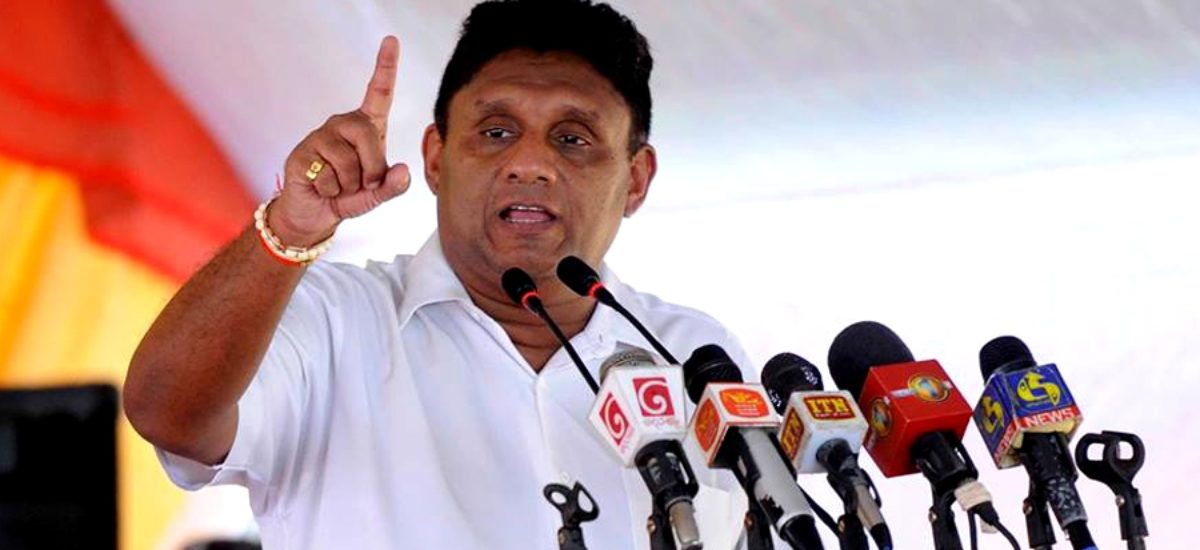Photo courtesy of RUnews
Subsequent to the recent release of the report of the Presidential Commission of Inquiry on the Easter Attacks and after the UN Human Rights Council (HRC) in Geneva had passed a resolution highly critical of Sri Lanka’s current human rights situation, Opposition and SJB Leader Sajith Premadasa, speaking in Parliament has, on behalf of his Samagi Jana Balawegaya (SJB), articulated a clear national security and external affairs policy that offers a stinging critique of the ideologically driven and unsuccessful practices of the current administration and lays out a well thought out and centrist alternative on this important area of national life. The policy is noteworthy in that it is essentially a political counter offensive, taking on the Rajapakses in an area which they consider as their strong suit – that of national security and its counterpart, external affairs.
The foreign policy failures of the Rajapakse SLPP
Opposition Leader Premadasa clinically lays out the failures of the current administration. Firstly, he correctly points out that the UN High Commissioner’s report that created the basis for the HRC’s resolution focuses mostly on the current developments in Sri Lanka’s human rights situation after the November 2019 presidential election and much less on developments during war era. The report is not as much about the past as it is about the present. The focus and concern of the international community and the articulation of its responsibility towards conflict prevention is based on and focuses on the failure of Sri Lanka to create a just peace, rather than a critique of a justified war.
Looking at the voting patten in Geneva, where the SLPP Government’s position received just 11 votes, it was an all-time low for country specific resolutions on Sri Lanka. The lack of support was in large part due to the abstentions of Sri Lanka’s traditional friends in the international community, including India and the Muslim nations.
The centralization of state power through the 20th Amendment and the resultant weakening of state institutions that are required to be independent, together with the steady militarization of governance and the erosion of democratic space and freedoms, are all policy and political failures of the current Government. Sajith Premadasa forcefully and convincingly argued in parliament that these developments are not in the interests of either the majority community or for that matter even the minority communities in our diverse country.
The failures of the Presidential Commission of Inquiry on the Easter Attacks
The Leader of the Opposition was stinging in his critique of the Presidential Commission of Inquiry on the Easter Attacks and its report. Drawing comparisons with the US Commission of Inquiry on the 9/11 attacks, he pointed out that despite a period of nearly two years, the Sri Lankan Commission had failed to identify who were the masterminds or the key conspirators behind the attack. The informal nature of the crucial National Security Council (NSC), which is not a statutory body, was also criticized by Mr. Premadasa who proposed that the NSC be formalized through an enabling Act of Parliament and that a single coordinating center for the diverse security and intelligence agencies be created. He promised bipartisan support for any genuine national endeavors while criticizing the politicizing of security issues through ideologically driven unilateral actions followed by blaming regime opponents, as opposed to implementing genuine remedial measures.
Internal strife as a weakening of national security
Sajith Premadasa articulated a truism, widely recognized globally but completely ignored by this Government, that national security is multifaceted and not just based on military or defense policy alone. He argued on the need for economic security. But most importantly, the SJB leader argued forcefully that internal divisions, ethnic polarizations and communal strife cause a significant weakening of national security by alienating huge swathes of society from affinity to, identification with and loyalty towards, the Sri Lankan State. A state that is non inclusive and exclusionary weakens itself. Surely one of the biggest and most objectionable aspects of the LTTE, which we fought for decades to defeat, was its vision and desire for a mono ethnic Tamil state; one in which even Muslims were excluded. Surely having defeated the effort to create a mono ethnic Tamil state, we should hardly be moving in the direction of creating a mono ethnic Sinhala state in which Muslims and other ethnic and religious minorities are excluded.
Making a commitment to both devolution and accountability
The opposition and SJB Leader was bold in breaking away from the new dogma of the current Government, which is that even the currently constitutionally existing devolution of power to the provinces under the 13th Amendment is unwise and unnecessary and that there is no need for any accountability with regards to human rights. The SJB leader committed unequivocally to the implementation of the 13th Amendment to the constitution. A commitment to constitutional governance which would not be newsworthy or surprising except that the Government has repeatedly disavowed the same. Further, in recognition of the international and domestic requirement for accountability with regards to human rights violations, the Opposition Leader committed to an internationally credible domestic process of accountability with foreign observers and the required foreign technical assistance as well as the implementation in good faith of the recommendations of both Sri Lanka’s own LLRC and the Paranagama Commission reports. The significance of this policy, a relatively very centrist position, is a platform to create broad domestic and international consensus on the issues. On the contrary, as internationally observed and carefully documented by the UN High Commissioner for Human Rights, the current Rajapakse Administration has shown zero interest in either post war reconciliation, accountability, the protection of human rights or the promotion of fundamental rights and freedoms.
(The writer served as Advisor, Ministry of Foreign Affairs from 2016 to 2017)


